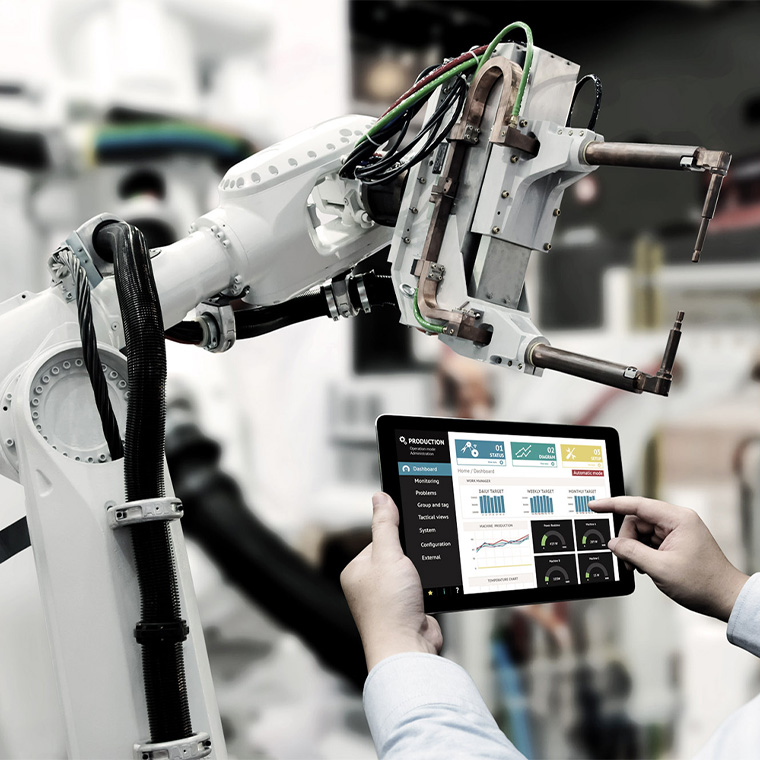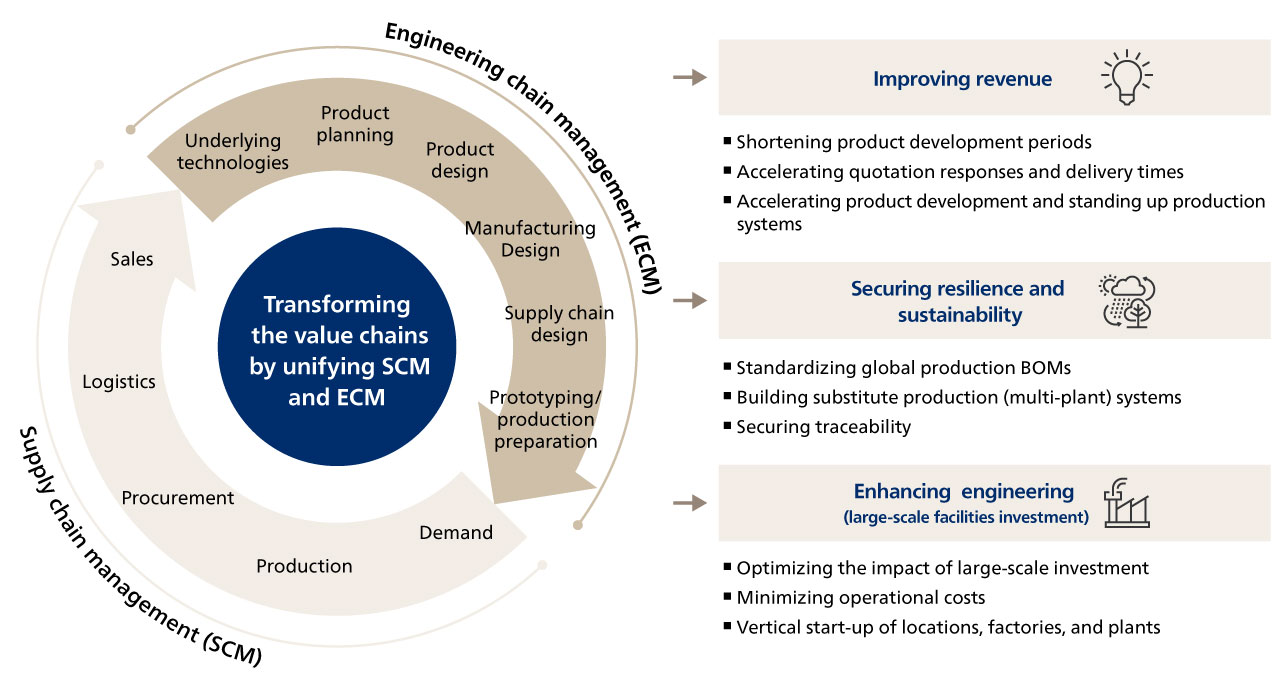Raising corporate value by merging the engineering and supply chains as a value chain system
Engineering Chain Management
Service
Engineering chain management (ECM) will be the next big theme in company transformations after supply chain management (SCM) transformations. ECM was previously preoccupied with the transformation of research, design, and development departments. The rapid development of digital technology is forcing ECM to encompass fundamental transformations on a company level (PLM: product lifecycle management, unified from development to provision). The goal is unified coordination across the value chain, from the upstream research and development stage to the front lines at the production, quality assurance, procurement, logistics, sales and after-service stages.
ABeam Consulting is ready to help raise the value of your business and resolve your management challenges with our extensive experience in supply chain management transformation.
Trends/Challenges
Building an engineering chain that strengthens revenue
Global businesses face intense competition from existing competitors and the growing numbers of new challengers. Clients are demanding compressed time scales, shorter product development periods, earlier release dates, and faster quotation responses and delivery times for products. The ability to meet these demands will separate the winners from the losers.
Companies are seeking to accelerate product development to meet these demands by improving engineering chains, enhancing design processes, seamlessly connecting their supply chains to digital technology, and standing up production lines and logistics systems in parallel with their design processes. They are seeking to speed up the process of quoting, estimating delivery, and supplying customized products by implementing seamless coordination that connects BOMs (bill of materials) from development to sales, production, and after-service.
These information sharing platforms reduce manufacturing costs and support new business models such as service businesses and customer support, which improves revenue.

Building engineering chains that ensure resilient and sustainable supply chains
Supply chains are exposed to unprecedented risks, such as production stoppages due to pandemics, natural disasters and cyberattacks, fragmentation of supply chains due to conflicts between nations, global semiconductor shortages, and procurement crises stemming from issues such as conflict mining.
Companies must prepare global BOMs by improving the resilience of their supply chains. They must also create shared global production BOMs to build a global network of substitute production systems (multi-plants) and to centrally manage information about standard and substitute parts and suppliers.
Standardizing global BOMs allows companies to see their suppliers and where components are being used across their product ranges. This helps secure the sustainability and traceability of supply chains and responds to demands for greater corporate social responsibility. Preparing BOMs also helps organize and share past design resources across businesses and pass that development and production knowledge to future generations.

Enhancing digital technology-enabled engineering (large-scale facilities investment)
Advanced technology has made it possible to optimize the impact of investments on engineering. This affects the manufacturing process from product development to supplying markets and considers large-scale facility investment in new factories, plants, and logistics facilities.
First, companies must examine the return on investment from their supply chain when deciding on new locations, or when merging or discontinuing existing locations. Companies must also ask where they should locate production facilities, what they should make at each location, where to establish or merge logistics sites, how to create delivery networks, and how they can reduce costs and delivery times. They also must know how far to go when mitigating risks, based on production costs, logistics costs, labor costs, taxation, and geopolitical issues.
They must pursue a return on investment when standing up individual sites. They also need to conduct design work that accounts for internal layouts, operational processes, and facility and information systems to meet service level demands and minimize investment and operational costs.

Where ABeam Stands Out
-
Leading specialists in engineering chains
ABeam specialists have extensive experience in the supply chain and engineering domains and are driving transformation across numerous companies. ABeam is ready to support your transformation with a team of cross-domain experts.
-
Knowledge developed through engineering chain transformation
ABeam has a track record of building global engineering and supply chains centered on companies in Asia and deploying them around the world, allowing us to develop our unique methodology based on advanced benchmarking and case studies.
-
End-to-end support, from design and implementation of supply chain transformations to value creation
ABeam works with clients to take a leading role in involving stakeholders, implementing business transformations, improving operational processes and systems, and creating value.
Services Provided
ABeam Consulting has an extensive track record of providing end-to-end services focused on achieving management goals by transforming value chains for businesses centered in Asia and in working closely with people on the ground.

Supporting the unification of SCM and ECM for value chain transformation
-
Supply Chain Redesign and Process Transformation Support Service using Digital (Japanese)
-
Factory Assessment Service (Japanese)
-
Future Factory Design - Manufacturing DX Journey -
-
PLM Reform Support Service for Made-to-Order Manufacturers (Japanese)
-
Process and Production Line Simulation Analysis Service (Japanese)
-
R&D Business Process Reform and Product Development Support Service (Japanese)
-
IoT Data-driven Manufacturing - Smart Manufacturing Operations -
-
IoT Data-driven Engineering - Smart Process Engineering -
-
Data-driven Manufacturing for Food Factory
-
Sensor Concierge Data ready for smart factory
-
Facilities Maintenance Management Diagnostics (Japanese)
Click here for inquiries and consultations
